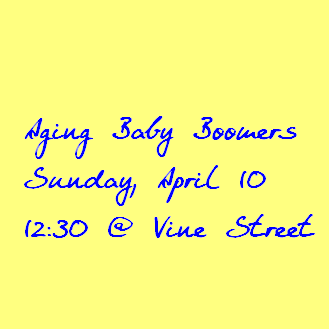 During May, we continue our aging:360 focus with a series of Wednesday night programs and meals. Our members have raised many good questions, and we will address at least some of them each week:
During May, we continue our aging:360 focus with a series of Wednesday night programs and meals. Our members have raised many good questions, and we will address at least some of them each week:
As an adult child, how can I be more diligent in ensuring that my parents are able to retire and be cared for? Are there any tips on how to talk with aging parents about choices? At the end of life, when is it time to let go, and how do I make my wishes known? Medicare, long-term care insurance, supplemental insurance, reverse mortgages – it’s such a jungle! Where is God in the so-called Golden Years?
May 4 – Easing Difficult Conversations
Dinner 6pm – Program 6:30pm - Dinner reservations by Monday, May 2
Childcare provided - Call the church office if you need transportation
Facilitator: Carol Smith, Counselor, Pastoral Counseling Centers of Tennessee
Communication between aging parents and adult children is often strained because of difficult decisions that need to be made. Many of us just don’t know how to talk about making the home more accessible, changing living arrangements, finding in-home care, monitoring bank accounts, writing living wills, managing medications, or dealing with driving limitations.
Carol Smith is a Family Therapist; she will give us some tips that apply to all kinds of situations, and she will also try to answer our very specific questions.
May 11 – Caregiving and Support
Dinner 6pm – Program 6:30pm - Dinner reservations by Monday, May 9
Childcare provided - Call the church office if you need transportation
Facilitator: Nancy Pertl, Caregiver Education Specialist with the Mental Health Association of Middle Tennessee
Caregivers provide 80% of the care for individuals. Especially with Alzheimer’s disease and related dementia, caregiving can be particularly stressful. Making decisions about healthcare, communicating with physicians, knowing what to expect as the disease progresses, mobility and safety, making arrangements so the individual can stay at home and making decisions when that may not be possible any longer, are all decisions that caregivers face. What about the caregivers needs? When do they feel that they have time for friends, church, a movie, or a walk in the park? What about the caregivers’ health and well-being?
May 18 – End of Life issues
Dinner 6pm – Program 6:30pm - Dinner reservations by Monday, May 16
Childcare provided - Call the church office if you need transportation
Facilitator: Greg Rumburg, Chaplain, Odyssey Hospice
Our physical, emotional, and spiritual needs change as we near the end of our life. When individuals and families are faced with decisions about the type of care they prefer at the end of life, they often wait too late to make their plans. Discussions about hospice care for life-limiting illnesses and discussions about palliative care for those with terminal illness can often be supportive to both the individual and to the family members. Knowing what to expect and making plans can take some of the burden off the family. Grief is inevitable, but support from clergy and bereavement experts can help. Knowing the individual’s wishes about funeral arrangement can help the family make better decisions with which they feel comfortable.
Greg Rumburg is an Elder at Vine Street, and as a hospice chaplain he walks, talks, sits, and prays with individuals and their families as they approach death. He will share his knowledge and wisdom with us.
May 25 – Navigating Medicare and Planning for the Future
Dinner 6pm – Program 6:30pm - Dinner reservations by Monday, May 23
Childcare provided - Call the church office if you need transportation
Facilitator: Lucy Utt, Tennessee Commission on Aging and Disability, Supervisor, State Health Insurance Assistance Program (SHIP)
Medicare is a federal government health insurance program that provides medical care and prescription drug benefits. You become eligible for Medicare when you turn 65 years of age or if you are under the age of 65 and have a disability. Medicare Part A is for hospital coverage, Part B is for medical care, and Part D is for prescription drug coverage. What all does Medicare cover? Do I need an Advantage Plan? Do I need supplemental insurance? What about long-term care insurance? What happens if I need long-term care in my home or in a nursing home? What if I can’t make decisions on my own? What if I run out of savings, will I lose my home?
Meals at 6pm
The Wednesday nights in May are great opportunities for learning, but they are also opportunities for fellowship and for getting to know each other. So pick up the kids and come on over for dinner! We have partnered with Copper Kettle to provide a delicious meal for us each week, and we will have childcare available as well.
We ask that you make meal reservations no later than Monday morning of each week, but you can make them as early as right now. We will take your reservations online, over the phone (call the church office at 269-5614), in person on Sunday mornings (look for the people carrying sandwich boards!), or with print forms available in various places at church.



